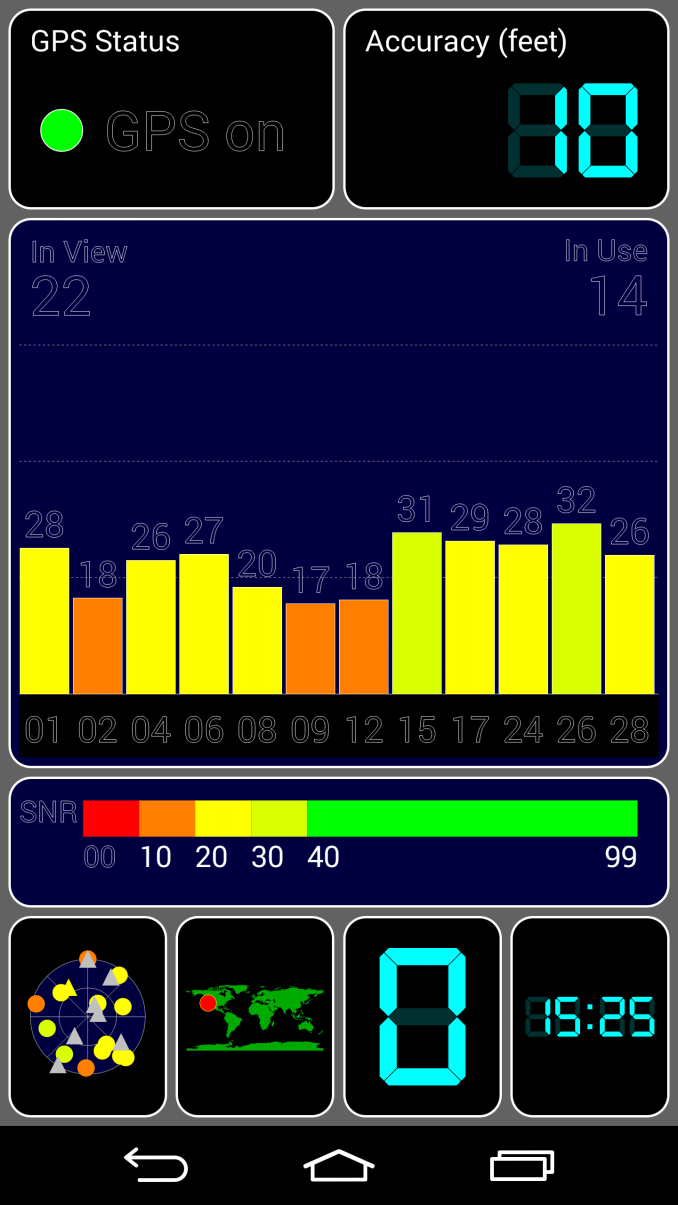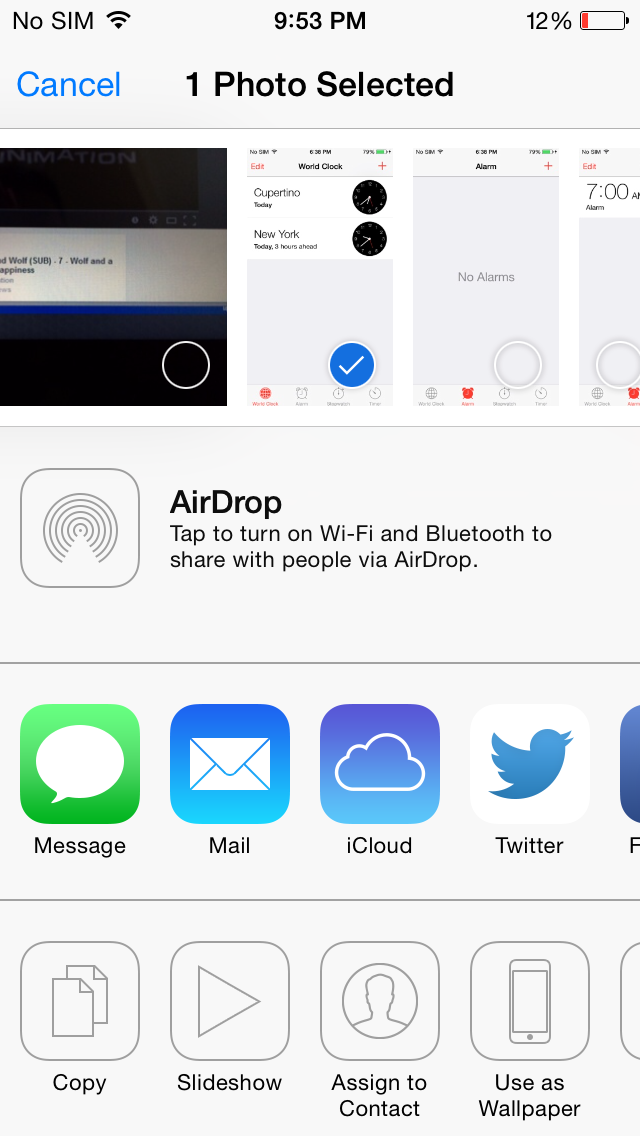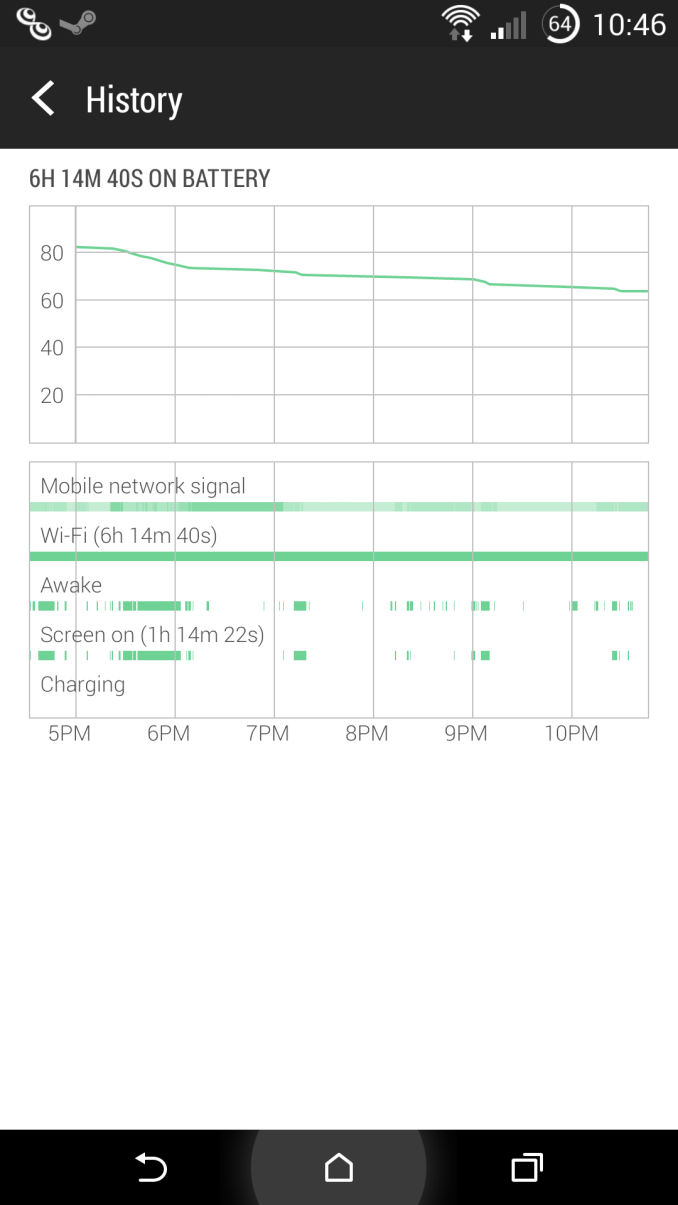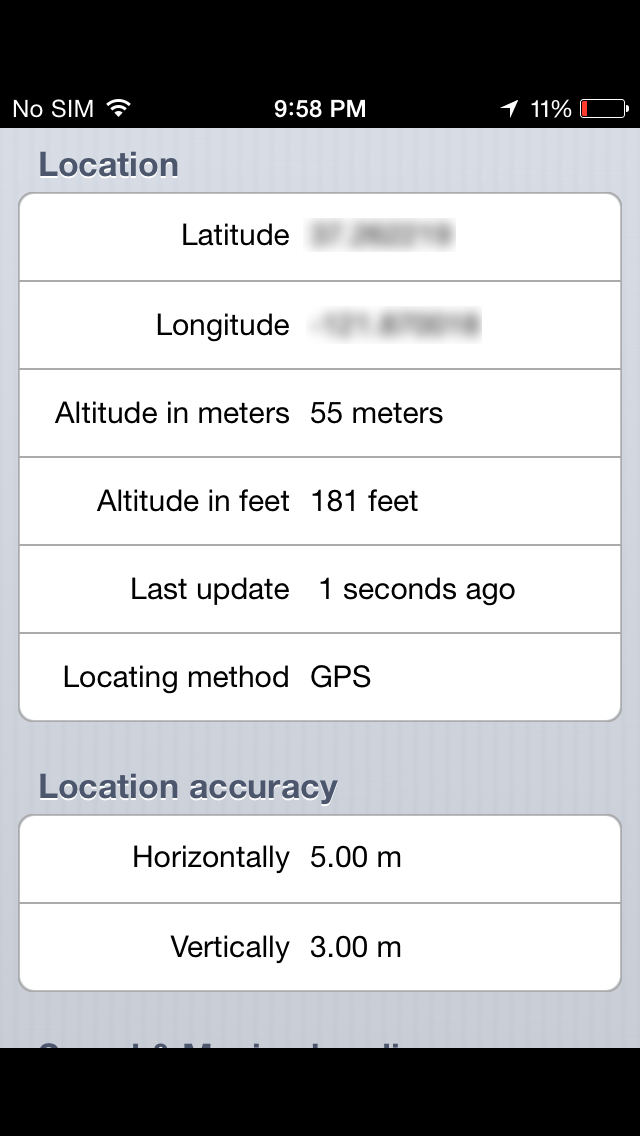A Month with the iPhone 5s: Impressions from an Android User
by Joshua Ho on August 24, 2014 7:00 AM ESTSoftware
From a purely functional perspective, there are some pain points involved in moving from Android 4.4 to iOS 7. While it’s been talked to death now, the lack of a system similar to intents on Android and the lack of customizable keyboards are definitely a bit on the frustrating side. For example, while on Android manually uploading screenshots, photos, and video to Dropbox is a relatively painless process, doing the same on iOS isn’t possible. While one of the first things I do on any Android smartphone is install SwiftKey, it’s not possible to do the same on iOS. This immediately causes my typing speed to drop, although in the case of iOS’ keyboard this is mostly due to the lack of punctuation in the letter page. However, these two immediate issues are about to be irrelevant with the release of iOS 8, so this is more of a temporary issue than a permanent one.
Although also temporary, for those that have become accustomed to the significant amount of custom control provided by camera apps from HTC and Samsung, the iOS camera application is comparatively barren. There's the ability to toggle HDR, flash, tap to focus/expose and lock focus/exposure. In effect, there's no real way to set manual controls. While the auto mode is pretty much as good as it gets, I find myself missing manual controls when it comes to taking macro photos and in other similarly extreme conditions.
There are a few other issues though. To someone that has almost solely used Android smartphones, the notification drawer has some odd behavior. It’s never really made sense to me why notifications can only be cleared by application. I definitely think a clear all notifications button would be a good addition for the future, but this is only a significant problem if a large number of notifications build up without getting cleared away. I'm also not sure what the value is to segregating "all" and "missed" notifications. Android definitely handles this better, although it probably makes more sense to those that have used iOS' notification system from the start.
Outside of these issues, there’s quite a lot to like. The vast majority of applications that I used had a consistent style that fit with iOS 7, with no strange scaling issues or unexpected behavior. This still tends to be a problem in Android, so it’s refreshing to have an app ecosystem that tends to keep up with the design guidelines set with each new iOS release. There’s also just about no stuttering or pausing in the experience. While Android L and ART should bring much better performance to Android smartphones, in iOS it seems that such performance issues haven’t really existed in the first place.
iOS and Android/Sense 6 battery stats
Of course, while there are some issues that could be fixed, there are others that are much more fundamental. One of these is direct access to the file system. While it’s quite convenient in Android to trawl through system files to learn about the underlying hardware and move around data using a file explorer, it makes sense to completely sandbox applications from each other to improve security. Another advantage of sandboxing applications is that orphan files are nonexistent, which is an issue on Android devices.
In addition to file system differences, it’s a bit frustrating to not have detailed battery life statistics when it comes to how much CPU time each application consumes, how long application wakes up the system while the screen is off, and similar details. However, it once again makes sense for Apple to do this. After all, iOS battery management is already quite stringent. In general, applications are strictly regulated and most cannot run in the background for any significant amount of time. On Android, it's possible for a single rogue application to ruin battery life, but this same system means that multitasking tends to be much faster and smoother.
If anything, this may be the real difference that matters when comparing iOS and Android. While Android and iOS are largely similar in features, there is a fundamental divide in the way the two OSes are designed. At its core, iOS is designed with average users in mind. As a result, there’s a strong emphasis on making things “just work” and hiding information that would simply confuse and frustrate people that don’t care about the underlying hardware and software. Android at its core is targeted at those that want to have the full PC experience on their phone, and as a result there’s much more information and low level functionality for those that want it. However, this can easily be frustrating and confusing for the end user. Of course, it’s fully possible for iOS to adopt features that would be targeted at advanced users, and Android can be changed to be more user friendly. If anything, this hypothetical has been the case for the past few years. Over time, Android has become a more friendly OS with the removal of the search and menu keys, going from the dark themes of 2.3 and 3.0 to the brighter, cleaner designs of today. Things like Google Maps have become considerably more simplistic, and even microSD slots had significant restrictions added to them in an attempt to simplify the user experience. Similarly, the fact that manual camera controls are even possible speaks to how Apple is adding more niche features.

GPS Info! on iOS and GPS Test on Android
However, the differences remain, and understanding this is as simple as looking at how equivalent features are implemented. For example, location services in iOS are binary in nature, and can only be turned on and off globally or for each application. In Android there’s noticeably more nuance. Location can be done only by on-device GPS, or by using WiFi/cell tower location, or by using both. In addition, it’s possible to view GPS data such as per-satellite SNR and number of satellites used and in view.
Final Words
At the end of the day, the iPhone 5s has aged quite well. While the hardware quality is a cut above, it’s more than just a matter of pure hardware. It’s clear to me that the user experience wouldn’t be nearly as good without Apple’s strong control over software. TouchID is quite possibly the best example of this, as there’s no need to wait for an official API to support fingerprint authentication for App Store purchases or other similar situations. While I felt a bit constrained by the limits in the operating system, the integration and overall quality of the experience outweighed these disadvantages. I’m not quite sure if either is better at this point, as while I definitely enjoy the amount of low-level information and customization available on Android, iOS has a much more polished and highly integrated experience.
However, in the long run it seems likely that they will converge towards largely similar feature sets. This doesn't mean that they'll be identical, as there's a distinct parallel in the Mac vs Windows debate. In Windows, adoption of new hardware features into the OS tended to be slower and not as well integrated as the OS vendor and multiple OEMs had to try and coordinate such a task. However, a major advantage of such a system was that backwards compatibity and flexibility was greater, even if it was more complicated for the end user. Similarly, Mac has tended to have new features at a faster pace and with better integration, such as high DPI displays. However, the result tends towards less control over low-level settings and less visibility into low-level information. The tight integration between hardware and software also means that it's harder to provide extensive backwards compatibility.
Of course, these are mostly broad strokes. It's not really possible to predict what the future holds, but even now we can see major differences. Google has allowed for custom OEM UIs on top of Android, and doesn't profit directly from the sale of Android OS. Similarly, the nature of smartphones dictates tight integration, so it's not really possible to upgrade the OS without a new BSP and major work on the part of the OEM to push an OTA. Apple has also managed to ensure that the app ecosystem of iOS is equal to or greater than any other mobile OS, something that was a major stumbling block with Mac OS in the early days of personal computing. While a great deal of maturation has occured in the smartphone market, there is still a long road ahead before the story can end.



_575px.PNG)
_575px.PNG)
_575px.PNG)










197 Comments
View All Comments
batongxue - Monday, August 25, 2014 - link
How many people are really enjoying those low-level fiddling on Windows and Android?First developers, and then maybe some tech enthusiasts.
Most people (I could confidently say well more than 90 percent) are users (not just average users, but pros in professions other than software developers) that utilize the functions, instead of wasting their time figuring out what every system file means.
flamencoguy - Tuesday, August 26, 2014 - link
Some people like to customize cars and some people customize phones. Personalization is great. We don't all want to look the same and dress alike.Alexey291 - Wednesday, August 27, 2014 - link
you mean to say that some of the best selling apps (icons, launchers and themes) in android app store actually don't exist and never get used?Because for a lot of people (I'd bet for most) this is what customisation entails. Changing the launcher, the lockscreen and some icons and stuff.
And honestly? You're wrong about 90% its more like 99.9%. And yet the said 99.9% STILL get to customise their phones without having to learn what every system file does :)
The day you can change the launcher in ios (to something like that for example: https://www.youtube.com/watch?v=QpjGAhXplmI ) without having to jailbreak or do anything more than download an app from the app store will be the day when ios would become a good o/s for me. :)
mtbogre - Monday, August 25, 2014 - link
"Anandtech has become very iCentric over the years. I recall the day the iPhone 5 came out they did 14 articles on it. So we are clear, that is not a typo - 14 articles. Any other phone gets 0 to 2 articles at the most."The reverse is more accurate. This site is completely dominated by Android coverage. Click on the "SmartPhones" tag and you'll see many times more stories on Android than iOS. Lots of stories on this site about phones I will likely never see and can't even buy. How many variants of the S5 got a full review in spite of the fact that they were essentially feature tweaks on the base?
iOS and the iPhone account for fewer than 1/10th the volume of smartphone articles on Anandtech even though they have much greater than 10% share in the regions where this site is commonly read.
akdj - Tuesday, August 26, 2014 - link
Low level functionality? I own em both. Have since day one in '07. Don't forget Android's 'new' UI wasn't available for almost a full year later. iPhone 1,1 flopped the industry on it's head. Regardless of your opinions, 14 articles on the biggest, fastest, most adopted technology in the world doing a 180° turnaround, eventually bankrupting or elimating the top echelon in a flail swoop, seemingly belongs on an electronic-centric site, wouldn't you agree? Maybe Anand's crew saw the sea change before many of us? I own the Note 3 for my business. 5s for personal handset. I love them both but when it comes to 'apps' and the selections of software available between the two it's iOS that's leaps and bounds ahead of Android. It's unfortunate because I love my N3. But playing Asphalt 8 on both or using sketchbook pro, the obvious shortcomings in software optimization becomes apparent. With half the cores, clocked at almost 50% & ⅓ the RAM, my iPhone and iPads play games quicker, allow for significant flexibility with media; stills, motion, artwork or simple things like the continuity with my iPads and now OSx with 10.10As an obvious fan of both, I'd love to see Google gain some vertical/horizontal direction with the new APIs. I'm not sure a Chromebook is by most folks standards today a 'computer'. Without ubiquitous broadband or WiFi, LTE or a connect 'portal', it's worthless. Windows and OSx on the other hand, this ...at least in the short term IMHO is the direction we're facing. Just as we heard at WWDC, the vision to aggregate and integrate the iOS and OSx 'systems' to your toolbox, each knowing what the other is up to! Continuity. Handoff. Swift and Metal GPU 'low level programming, speaking of ...eliminating the overhead bulk of Open GL is big. And when I get to my laptop to finish manipulation in Lightroom, finish a .doc, or finalize/render my movie, I can as easily switch from iPhone or iPad to my desk/laptop for the horsepower and time/energy savings.
I love the Note 3. I concur with just about every point the author makes. That said a month with either iOS or android is a tough period of time to adjust. I've had both since 07/09 respectively. Enjoy and respect each for capabilities but low level, SoC, ROMs or Roots ...@ 43 married,with kids and a family owners business going on three decades I don't have A) the time to play around in the depths of programming my phone and B) I HAVE to have consistency, reliability and efficiency. Each had on the iOS and OSx side of our tool box. My Windows 7 "& 8.1 systems, while they 'work' with Android as a 'disc' I've found the compatibility within Apple's Eco system to be heads and shoulders above Androids. Not Google's fault! Releasing open source code for a phone and tablet 'first' makes the 'back end' task look like a pair of Mt Everests stacked atop each other.
This is also where I see Window's mobile OS becoming less metro and note functional with it's mothership, the full 64bit Win '9' or whatever it's going to be called. As a developer now for five years as well, we've released four iOS apps and the same four were attempted to port over to Android. Three worked. Two well enough. The third is still being worked ground up as we don't have the corporate EA credit card or back catalog of gaming rights, we don't play cover songs :-). Each of our apps is unique. That said if those on either side have been there for any length of time, investment in the software and apps becomes more obvious over time and with usage. Unfortunately the software for Android isn't there yet. Nor are the 'development dollars' unfortunately as I do want them to both succeed
I suppose last I'd add the display size mantra. My N3 for media, writing, watching, drawing, even playing games is better than the iPhone because I'm 43 and can't read a damn thing anymore without my cheaters. Next level though, my new iPad mini destroys both for any of the above. For a front pocket, non obtrusive 'carry everywhere' phone, 5.7" is a bitch to pocket unless I'm in cargo shorts or pants. iPhone fits anywhere and everywhere. I like the 4.7" compromise but will hold til I see what Apple's new Phad...I mean Phablet's design looks like. With my clientele, the stylus is invaluable for sketching our rigging points, sign docs and credit cards, as well as handle the two duties in one. Both as a computer and phone. iPhone is a bit tougher but again, as the author mentions subtleties like the camera, workmanship and cosmetics, fluency of UI and it's 'lack of size or bulk' is and will continue to be many folks' choices moving forward.
I also agree it's a cool time to be experiencing technologies fruits. To be blinded by iOS as an Android fan or vice versa one's missing the forest through the trees. A true 'geek' is excited by both. Just. Not. Low. Level. Programming! XDA is an incredible tool to have in your arsenal, but it's a bit more convenient if you don't like TouchWiz, re skin with NOVA, GO, or any pleothra of options to adjust the phone to your style. Looks like Apple is opening up a bit as well if you delve into the Xcode update :-)
dj christian - Wednesday, September 3, 2014 - link
The quality of iOS apps higher than Android. You'r kidding right? Most have been shittier compared to Android.vasboz - Wednesday, August 27, 2014 - link
I believe this would be because Apple has a much larger adoption for the one device than any other device globally. Plus it attracts more viewers, hence more revenue from advertising etc.. These are just "touching" the tip on the iceberg of just how much more there is to it than what you see.stucktrader - Monday, September 1, 2014 - link
If it comes across as iCentric to you... i dont see that at all...He pretty much laid out what he felt were quirks... pros and cons...
The iPhone 5 does not need 14 articles... that is for sure...
The Android world is filled with so many different OEMs... why would you be surprised that they only get 2 articles... that is EXCEPT for Galaxys...
If anything... why is the world of Android so fixated on Samsung... when at times other phones are superior depending on the feature being highlighted... LG, HTC, SONY, etc...
jahblade - Monday, September 1, 2014 - link
In reference to ios vs android users. When I am asked which one is better I don't have an answer for that, I just simply echo in general your comment.primalxconvoy - Sunday, September 7, 2014 - link
Without reading too much into this, I believe this:"Iphones are smartphones for dumb people, whereas Androids are dumbphones for smart people".
What I mean is that with ios, even smart people don't need to think too much about using the device (or prefer not to) and can use the phone relatively easily for a limited range of uses.
Android, by comparison doesn't really allow for ease of use and needs more thought our effort to get any particularly specific user-experience out of it. Users, perhaps, need to be "smarter" in order to get the most out of it (often using this party solutions to overcome problems).
Another analogy is ios is to Disneyland, what Google is to Woodstock.
In other words, Ios is restricted, expensive to get into, with long lines to get in (especially on release day), but everything that is featured there usually works well, with plenty of staff on hand to guide even small kids around.
Android, by contrast, is open, fairly cheap and can potentially host amazing, world changing features, but the toilets don't work, the organisers are nowhere to be seen, the staff are all smoking pot somewhere, and most of the stalls and infrastructure are unfinished, with anything that does work usually being due to a third party vendor or artist taking it up themselves.